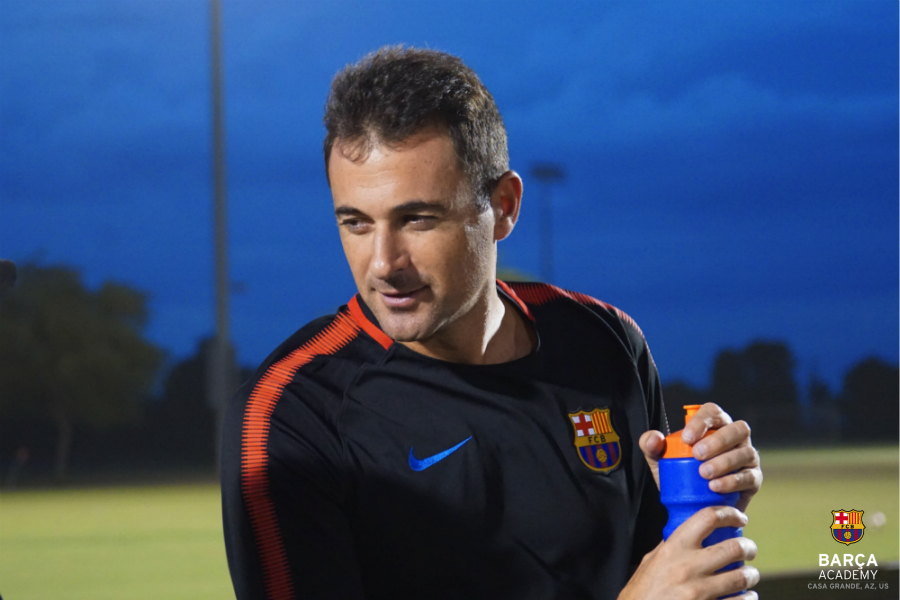When I sat down with Denis Silva, Technical Director of Arizona’s new Barcelona Academy, back in September, I never dreamed I’d be publishing on the h
When I sat down with Denis Silva, Technical Director of Arizona’s new Barcelona Academy, back in September, I never dreamed I’d be publishing on the heels of the United States Men’s National Team’s cataclysmic implosion in World Cup qualifying.
I didn’t plan it, and certainly Silva didn’t either, but the wisdom of this man, who in the last six years has traveled from Barcelona each summer to see the American youth system up close, seems incredibly, if painfully, important today.
Early in 2017, after seven years at FC Barcelona’s famed La Masia academy, Silva was offered the opportunity of a lifetime: implement the Barça training system in the United States, where top clubs across the U.S. DA could get a good look at the results. Silva accepted without hesitation, and has begun his work on this unique project.
Head west a couple of miles on the dusty Gila Bend highway from Casa Grande, Arizona, itself a somewhat distant exurb from sprawling metro Phoenix, and you’ll be forgiven for thinking a desert mirage is in your sights. Rising above the cacti on the horizon is the Francisco Grande Hotel and Golf Resort (once a favorite getaway for John Wayne) and at its feet sits the Barça Academy.
With eight fields, 58,000 square feet of indoor training space, and comfortable residency accommodations, the place certainly is an oasis of sorts. Players who come here want for nothing, and indeed there is nothing preventing a player from reaching full potential.
Barcelona didn’t build the facility, but they intend to use it well. I hadn’t been speaking with Silva long before he began using the word that would define the conversation: mentality. Barcelona is here to identify American talent, yes. But Silva also wants to see improvement across youth development here.
“We have to change the mentality of coaching. It’s not easy work.”
Certainly not. But what, pray tell, is the mentality that will lift our own clubs, and our own national team?
Silva’s overarching philosophy, which he’s brought faithfully to our shores from Catalonia, is that growing the player is the only thing that matters.
“Barcelona is a club whose focus is teaching the players,” he said. “Barça never sells players. The only focus is the player.”
He said that the goal of La Masia is to get players to the first team. It’s hard to argue that. Academy alumni include such Barcelona stars as Lionel Messi, Carles Puyol, Pep Guardiola, and Andrés Iniesta (to name a few).
Here in the States, the concept of a fully funded academy, replete with coaches skilled at the game’s highest levels, is still fairly new, if we have any at all. Relatively successful programs in Dallas, New York, and Casa Grande – former home of Real Salt Lake’s installation – have produced skilled players who have become very important to their MLS clubs. MLS has even sold some players on to clubs in Europe, albeit with mixed results thus far.
But for a club’s youth system to produce the core of the senior team, and in turn part of the national team itself, is a far-flung dream that most American fans dare not explore.
Perhaps it’s time to change that.
Silva was mild-mannered in speaking with me, but he’s direct. “Players need to be open-minded,” he said. “They need to want to learn.”
Of course, he’s had to learn too. Travel for matches in the DA is a bit more strenuous than in Spain, the whole of which is the size of Arizona and Utah pushed together. But training is the same.
“We train the same way as Barcelona,” he said. Their goal is to create quality players who will perform in matches because of the way they have prepared. “We need to focus on the training session, not on the matches.”
I wondered, even in the short time he’d been in Arizona, whether Silva would be willing to pass judgement on the athleticism of American soccer players. With so many observers insistent that America’s best athletes are focused on other sports, it seemed relevant to see if we sized up talent-wise to what he’s seen in Spain, where soccer is king.
Apparently it doesn’t matter one way or the other.
“I think here the players are too much focused on the physical, being faster or stronger,” he said. “I say to my players, ‘the fastest player in Barca is not who runs faster. It’s who makes the ball run faster. Who looks before… who’s in the best position, who makes the best decision.’”
He’s bullish on the crop of players he has now, but stresses that Barcelona was not built in three months or one year, and neither will his new academy. However, he is looking forward to the upstart institution adding younger teams in upcoming years.
“The younger we teach them, the more years we have to teach them. It’s better for them, better for us.”
Our conversation closed on the familiar theme of the mentality of youth coaching. To be sure, Silva isn’t arrogant or preachy on the subject, but he’s firm in his belief, and focused on delivering the Barça experience in Arizona.
It’s not a secret among soccer minds in this country that pushing for trophies at the youth levels, when it’s at the expense of player-focused development, is a crippling detriment to our adult player pool. It’s still a problem, however, and while it isn’t the primary motivation for Barcelona’s presence here, Silva thinks that what he’s doing will definitely be noticed.
“Once people understand what we’re doing here, they will like, or they won’t, but they will realize that we are doing something different.”
